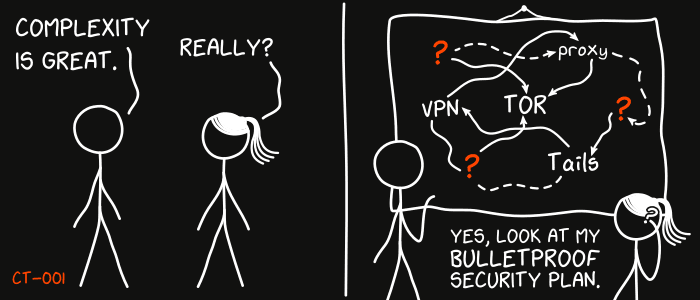Monero Observer – CT-001: Threat modeling demystified

[ad_1]
17 Oct 2022
[CT]
[guides]

This is the first report in the new Cypherpunk Transmission series.
Motivation
There is no such thing as full privacy and security. It’s impossible to protect all your assets from everyone all the time.
Everything is a trade-off, tools and techniques are ephemeral, and that’s why threat modeling is key.
A list of the most probable threats to your security and privacy endeavors shouldn’t be too hard to create.
Assumptions
- you care enough about privacy and security
Threat modeling A-T-F-R-M
(A)ssets - (T)hreats - (F)ails - (R)isks - (M)itigations
Let’s take a closer look at each step:
(A) Assets
What assets do you want to protect? Identify assets worth protecting.
(T) Threats
Who do you want to protect the assets from? Which adversaries might be interested in those assets? Speculate.
(F) Fails
How bad are the consequences if you fail to protect the assets from those threats? What capabilities does your adversary have?
(R) Risks
What is the probability that any of those fail scenarios might happen?
(M) Mitigations
How much convenience are you willing to sacrifice in order to prevent the fail scenarios? What are you technical and financial constraints?
Example scenario
Jane (34, married with kids, works at small company)
Jane thinks she might have a rare illness and doesn’t want her family, friends and co-workers to find out about it at this point.
(A)
(T)
- interested: family, friends, co-workers
- indirectly interested: big tech/search engines
- not really interested: ISP, OS, hackers
(F)
- family has access to Jane’s devices (laptop, phone)
- friends and co-workers can see her public social media stuff
- search engines can see the queries and her IP address
- the company might be able to get a hold of her search queries via a third party
- ISP/OS has the capability to inspect/capture/profile her traffic
- someone might be able to place a keylogger on her machine
- fail: people might change their behavior towards Jane
- fail: she might lose her job
- fail: blackmail is a possibility
(R)
- very high probability: friends see her social media posts related to the medical searches
- very high probability: family member accidentally finds browser with search query open
- high probability: family member sees targeted (medical) ads on her social media
- high probability: suspicious husband looks at the browser history
- high probability: the search engine shares her data with third parties
- very low probability: the ISP or OS shares traffic with her company (no real incentive)
- very low probability: a hacker could log her keystrokes and blackmail her (poor risk-reward)
(M)
- no-go: installing the tor browser/using a Tails usb might be a red flag; family could ask unnecessary questions
- no-go: locking (password) phone/laptop could also raise suspicions
- no-go: having a separate sim card dedicated to this (with no history/contacts) is risky and might become a burden
- plan: avoid posting anything related to (A) on social media
- plan: use a SearX/SearXNG search instance; always remember to close browser and clear history
- plan: use a separate (dedicated) browser in incognito mode on a home machine; do not use it for any other stuff (this should mitigate most probable scenarios)
Observations
Although imperfect, the random example above should provide a big picture view of the threat modeling process and hopefully help you get started.
Here are a few notes to keep in mind:
- review your security plan periodically and revise it accordingly
- do not share you own specific threat model scenario with anyone
- use pen and paper and protect/destroy the actual list after you’re done
- more complex != more secure; keep it simple
Feedback
Let me know if you find this helpful and, depending on interest, I will do my best to post a new Cypherpunk Transmission report every (other?) Monday.
Questions, edits and suggestions are always appreciated @ /about/.
-3RA
Credit goes to gnuteardrops from monero.graphics for the amazing xkcd graphic. Work and xkcd Script font licensed under CC BY-NC 3.0.
[ad_2]
Source link



















